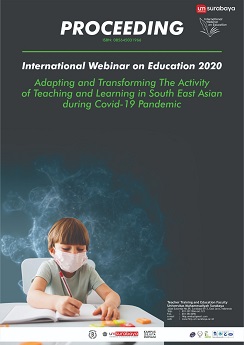Effectiveness of e-learning implementation as a distance learning strategy during coronavirus disease (covid-19) pandemic
Abstrak
Abstract.
This study aims to determine the effectiveness of the implementation of elearning as a distance learning strategy during pandemic coronavirus disease (Covid-19).
The effectiveness will be examined from the results of previous studies through metaanalysis methods Meta-analysis is the study of several research results in a similar study. The unit of analysis in the study of meta-analysis of these are documents written are taken from the journals the results of the research are purposive in accordance with the theme of research on the implementation of e-learning in the process of learning. The primary research instrument is there on the researchers themselves aided by the guidance documentation. Data analysis that was carried out was the analysis of quantitative and qualitative data. Quantitative analysis is used to analyze data in the form of numbers and the percentage of e-learning effectiveness. Qualitative data analysis is used for the study of data in the form of descriptive data about the implementation of e-learning. The results showed that the implementation of e-learning was effective as a distance learning strategy during coronavirus disease (Covid-19) pandemic.
Keywords: E-learning, distance learning, Coronavirus Disease (Covid-19)
Referensi
W. Abdullah, "Blended Learning Model in Improving Learning Effectiveness," Fikrotuna, vol. 7, no. 1, pp. 855–66, 2018.
VDK Ompusunggu and N. Sari, "Effectiveness of Edmodo-Based E-Learning Use on Mathematical Communication Skills," J. Curere, vol. 3, no. 2, pp. 58–66, 2019.
I. Indrawan, "Improving the Quality of Education," Al-Afkar, vol. 3, pp. 68–79, 2014.
R. Ardiansyah and D. Diella, "Implementation of Assessment-Based E-learning to Improve Student Learning Performance," Biosf. J. Biol. and educators. Biol, vol. 3, no. 1, 2019.
S. Muyaroah, "E-Learning Effectiveness with Moodle Application in Research Technology Development Study Program," J. Ilm. Univ. Batanghari Jambi, vol. 19, no. 1, p. 114, 2019.
NS Hanum, "The effectiveness of e-learning as a learning medium (evaluation study of the e-learning learning model of SMK Telkom Sandhy Putra Purwokerto)," J. Educators. Vocational, vol. 3, no. 1, pp. 90–102, 2013.
E. Susanti and M. Sholeh, "Design and Build E-Learning Applications," J. Tech. Akprind IST, vol. 1, no. 1, pp. 53–57, 2008.
P. Novantara, "Implementation and Effectiveness of Mobile Learning Using Synchronous and Asynchronous Learning Methods in English Language Learning in Android-Based Kuningan University," Buffer Inform., vol. 3, no. 1, pp. 22-27, 2017.
F. Fitriliza, "Effectiveness of the Use of E-Learning Learning Media in the Qowaidullughoh Course in the Pai Fai Uhamka Study Program," J. Educators. Islam, vol. 10, no. 2, pp. 85– 96, 2019.
NL Ulva, S. Kantun, and J. Widodo, "The Implementation of E-Learning with Media Schoology to Increase Student Motivation and Learning Outcomes in Basic Competence Describing Business Entity Concepts in the Indonesian Economy," J. Educators. Econ. J. Ilm. Educational Sciences, Econ Sciences. and Social Sciences., vol. 11, no. 2, p. 96, 2018.
ZM Effendi, "The Effectiveness of Blended Learning in Increasing Access to Learning in LPTK," Konaspi Viii, no. 24, pp. 1–5, 2016.
CC Astuti, HMK Sari, and NL Azizah, "Comparison of the Effectiveness of the Learning Process Using E-Learning and Conventional Methods," Proc. ICECRS, vol. 2, no. 1, p. 35,2019.
Widhiastuti, "Meta-Analysis Study of the Relationship Between Job Stress and Job Performance," J. Psychol., vol. Vol. 1, no. 1, pp. 28–42, 2002.
RL Garza Mitchell, "Online education and organizational change," Community Coll. Rev., vol. 37, no. 1, pp. 81-101, 2009.
NS Hanum, "The Effectiveness of E-Learning as Learning Media (Evaluation Study of Telkom Sandhy Putra Purwokerto E-Learning Learning Model) the Effectiveness of ELearning As Instructional Media (Evaluation Study of E-Learning Instructional Model of Telkom San Insmk Model," J. Educators. Vocational, vol. 3, no. 1, pp. 90–102, 2013.
D. Dwi Nuriyanti and N. Rahayu Utami, "Unnes Journal of Biology Education Development of Moodle Based E Learning as a Learning System for Motion Systems in High School Article Info ________________ Article History: Received in October 2013 Approved in December 2013 Published December 2013, "Indones. Gedung D6 Lt.1 Jl Raya
Sekaran Gunungpati Semarang Indones., Vol. 2, no. 3, 2013.
RU Candra Rolisca and BN Achadiyah, "Development of Learning Evaluation Media in the Form of Online Based on E-Learning Using Wondershare Quiz Creator Software in Accounting Subjects in High School Brawijaya Smart School (Bss)," J. Educators. Account. Indonesia., vol. 12, no. 2, 2014.
FS Rahayu, D. Budiyanto, and D. Palyama, "Analysis of E-Learning Acceptance Using Technology Acceptance Model (Tam) (Case Study: Atma Jaya University Yogyakarta)," J. Applied. Teknol. Inf., vol. 1, no. 2, pp. 87–98, 2017.
S. Azizah, E. Khuzaemah, and I. Rosdiana, "The Use of Problem-Based eXe-Learning Internet Media on Environmental Change Material to Improve Student Learning Outcomes in daily life and also student psychomotor (skills). The learning process can be learning materials and materials that are, "Sci Educ. J. Educators. science, no. 2005, pp. 197–213, 2017
CMD Hart, D. Berger, B. Jacob, S. Loeb, and M. Hill, "Online Learning, Offline Outcomes: Online Course Taking and High School Student Performance," AERA Open, vol. 5, no. 1, p. 233285841983285, 2019.






